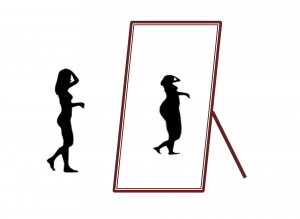 If patient is fit for outpatient treatment
If patient is fit for outpatient treatment
Anorexia nervosa is characterized by: the constantly increased fear of gaining weight although being at an unhealthy low weight below the minimun normal for height and age; constant food restriction in order to avoid weight gain; having distorted body image; over-concern about body shape; not being able to recognize and accept the situation even when the physical signs are there.
It is one of the most threatening eating disorders to your health and if others are worried and have told you about it, and even you can not see it (part of the disease), it is probably because it is affecting the way you see yourself. You still need to go to a special team for evaluation. Prevention and early diagnosis are the key to a faster and long term recovery.
 The approach to treatment is working with your multi-disciplinary i.e. your private care doctor and psychiatrist/ psychologist in order to restore your health and help you gain your energy back and control over your food, because now food is controlling you and your life.
The approach to treatment is working with your multi-disciplinary i.e. your private care doctor and psychiatrist/ psychologist in order to restore your health and help you gain your energy back and control over your food, because now food is controlling you and your life.
The dietary approach used is based on your medical status and the foods you already eat, while aiming to increase the variety of foods in your diet. The goal is provide your body with the essential nutrients, protein and energy in order to achieve a healthy weight and thus restore normal body function.
Common deficiencies are in protein (to build muscle), essential fats (used in the nervous system and brain), vitamin B1 (thiamin for a good metabolism), calcium and vitamin D (strong bones), magnesium (muscle function), iron and folate (avoiding anaemia).
The “dietrophy” tools that will be used, based on the latest scientific evidence for best outcome, include:
- Food diaries
- Nutrition education
- Goal setting
- Food supplements, where appropriate
- Support and guidance
